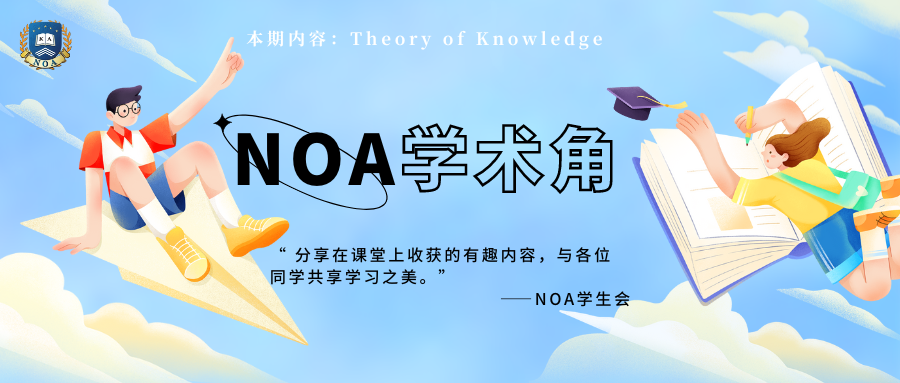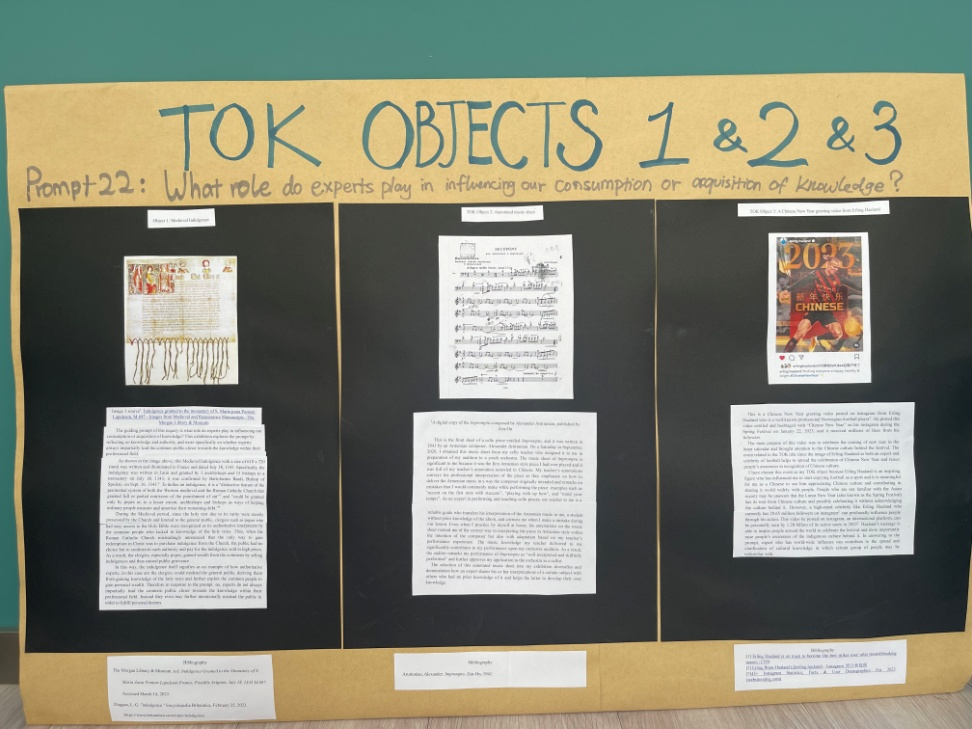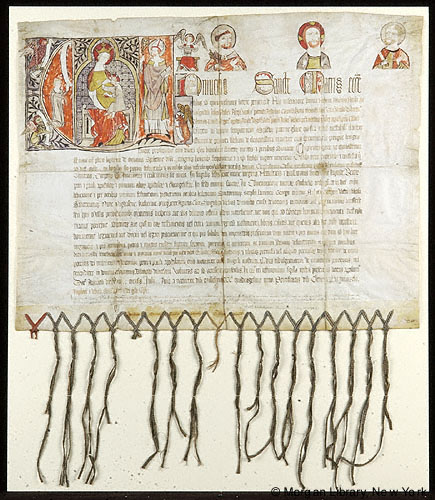IB “Theory of Knowledge:TOK Object Exhibition Comi
2023-06-28 08:51
来源:
作者:刘美晨同学
 作为IB的灵魂学科Theory of Knowledge,无论是否热爱这门课程背后的逻辑和内涵,相信每一位IB人都有一段与TOK难以忘怀的经历。
作为IB的灵魂学科Theory of Knowledge,无论是否热爱这门课程背后的逻辑和内涵,相信每一位IB人都有一段与TOK难以忘怀的经历。
曾有同学评价TOK是一个“神秘而发人深省”的课程;我们的TOK老师Mr.McDonald则认为TOK强调了整个IB的意义,因为它不是一门能够以死记硬背的方式来建立学生的批判性和创造性思维技能的课程。
对于非IB体系的同学,大家可能会问:
“所谓TOK具体学什么啊?哲学吗?”
“某种意义上讲,是的!”
根据IBO的官方解释,TOK是一门侧重批判性思维和探究学习过程的课程,所以它并不会包含具体的知识体系或是某领域的知识。从TOK里所学到的东西和其余六个主学科是互相支撑、借鉴的。TOK课程考察了同学们是如何知道那些我们自认为知道的东西,它鼓励大家去“analyze knowledge claims”并且“explore knowledge questions”。
TOK主要有两大评估内容,分别是TOK object exhibition和一篇TOK论文。就在最近,我们IB 11年级的同学们刚刚完成了三篇TOK object的终稿!目前,大多数同学正在着手准备自己的exhibition展板

用废弃的硬纸箱做的TOK展板,环保从TOK做起????
简单来说在TOK object exhibition中, 每位学生需要分别选择三个来源于自己生活中的事物,基于它们来写三篇commentary,意义在于运用自己对此事物的理解来探索一个TOK研究主题。一篇具有说服力的TOK object commentary常常会包含但不限于以下内容:
- Explained real life context of the object
- Reason(s) of why you have chosen this object
- How it contributes towards the TOK prompt
- Evidence of academic research
- …
举个例子,我个人探讨的TOK主题是“What role do experts play in influencing our consumption or acquisition of knowledge?”
相对应的第一个TOK物体,我选择了一张在历史课上学习过的中世纪赎罪卷。通过它来探讨“专家”在影响我们对知识的消费和获取方面扮演着怎样的角色,具体内容如下~
This exhibition object explores the prompt by reflecting on the aspects of knowledge and authority, and more specifically on whether experts always impartially guide the general public closer towards knowledge within their professional field.
Object 1: A Medieval Indulgence

▲The Morgan Library & Museum.n.d. Indulgence Granted to the Monastery of S. Maria Juxta Pontem Lapideum France, Possibly Avignon, July 18, 1343 M.697. Accessed March 14,2023. https://www.themorgan.org/manuscript/131045.
As shown in the image above, this medieval indulgence in a size of 610 x 720 (mm) was written in Latin and granted by Bartolomeo Bardi, the Bishiop of Spoleto, to a French monastery on September 16, 13431. Within the context of Roman Catholic Church during the medieval period, an indulgence is defined as a “distinctive feature of the penitential system of both the Western medieval and the Roman Catholic Church that granted full or partial remission of the punishment of sin”2 and “could be granted only by popes or, to a lesser extent, archbishops and bishops.” 3
During the Middle Ages, since the holy texts due to their scarcity were mostly possessed by the Church and excluded to the general public, clergies such as popes and bishops who had easy access to the Holy Bible were recognized as the authoritative interpreters of the Christian doctrine. Thus, when the Roman Catholic Church misleadingly announced that the only way to gain redemption was to purchase indulgence from them, the common people had to conform to the former authority and pay for the highly priced indulgence. As a result, the clergies gained wealth by selling indulgences and further caused public grievance.
Initially I came across this indulgence in my world history class, and it was given as one of the factors that contributed to the reformation of Roman Catholic Church. Being a Christian, upon realizing how clergies of the Church was once corrupted and had scammed faithful followers through the falsity of the indulgence, it pushes me to acknowledge the imperfectness of the Church. Indeed the indulgence itself signifies an example of how authoritative experts, in this case are the clergies, may misguide the general public, deviating them from the doctrines written in the holy texts and exploiting the common followers as a mean to gain personal wealth. Such TOK object has prompted me to consider that experts do not always impartially lead commons closer towards the knowledge within their professional field. Instead some may intentionally misguide others in order to fulfill personal desires.
1 The Morgan Library & Museum, “Indulgence.”
2 Duggan, L. G. "indulgence." Encyclopedia Britannica, February 25, 2023. https://www.britannica.com/topic/indulgence.
3 Duggan, “indulgence.”
Bibliography
The Morgan Library & Museum. n.d. Indulgence Granted to the Monastery of S. Maria Juxta Pontem Lapideum France, Possibly Avignon, July 18, 1343 M.697.Accessed March 14, 2023.
Duggan, L. G. "indulgence." Encyclopedia Britannica, February 25, 2023.
https://www.britannica.com/topic/indulgence.
版权及免责声明
①凡本网注明"稿件来源:新东方"的所有文字、图片和音视频稿件,版权均属新东方教育科技集团(含本网和新东方网) 所有,任何媒体、网站或个人未经本网协议授权不得转载、链接、转贴或以其他任何方式复制、发表。已经本网协议授权的媒体、网站,在下载使用时必须注明"稿件来源:新东方",违者本网将依法追究法律责任。
② 本网未注明"稿件来源:新东方"的文/图等稿件均为转载稿,本网转载仅基于传递更多信息之目的,并不意味着赞同转载稿的观点或证实其内容的真实性。如其他媒体、网站或个人从本网下载使用,必须保留本网注明的"稿件来源",并自负版权等法律责任。如擅自篡改为"稿件来源:新东方",本网将依法追究法律责任。
③ 如本网转载稿涉及版权等问题,请作者见稿后在两周内速来电与新东方网联系,电话:010-60908555。
